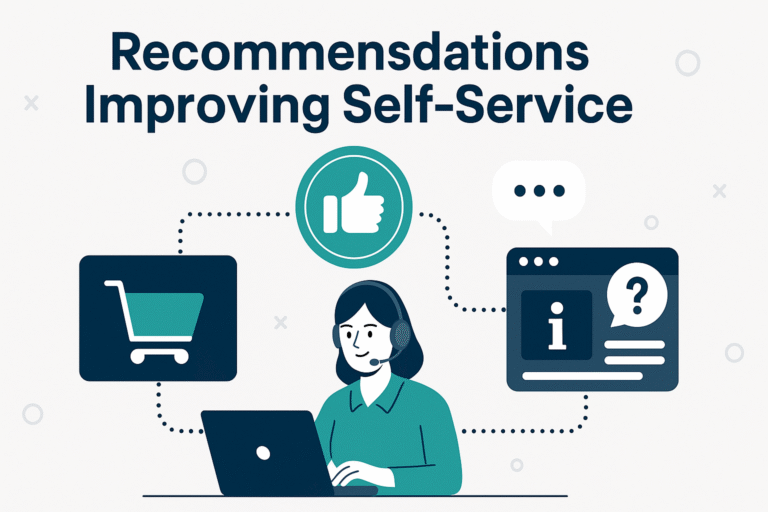In today’s digital economy, customers increasingly prefer self-service experiences over traditional support channels. Whether it’s navigating a product catalog, finding help content, or resolving issues independently, users expect fast, accurate, and relevant assistance without needing to interact with human agents.
This shift has prompted ecommerce brands, SaaS platforms, and customer support systems to adopt AI-powered technologies. One of the most effective tools in this transformation is the use of recommendations—smart, context-aware suggestions that guide users toward what they’re looking for.
In this blog, we explore how recommendations improve self-service, when it’s worth adopting these systems, and why Expertrec offers a powerful and efficient solution for ecommerce and digital platforms.
What Is Self-Service in the Digital Context?
Self-service refers to any system that allows users to complete tasks, find information, or make decisions without human assistance. In ecommerce and customer support, self-service tools include:
-
Site search
-
FAQ pages
-
Help centers
-
Product filters
-
Chatbots
-
Guided navigation
-
Personalized recommendations
The goal is to provide users with an intuitive, efficient way to accomplish what they need—be it finding a product, solving an issue, or exploring content—on their own terms.
How Do Recommendations Improve Self-Service?
Product and content recommendations significantly elevate the effectiveness and satisfaction of self-service systems. They help users:
-
Discover relevant products or content faster
-
Navigate large catalogs or help centers efficiently
-
Reduce cognitive load and decision fatigue
-
Find what they didn’t know they needed (serendipitous discovery)
-
Resolve queries faster in support scenarios
Let’s examine some key ways recommendations optimize self-service:
1. Search-Powered Personalization
By analyzing user behavior (clicks, searches, views), recommendation engines tailor results that align with the user’s preferences or intent. This removes the friction of browsing through irrelevant content.
2. Context-Aware Product Discovery
Instead of static search results, intelligent systems dynamically adjust what is shown based on user context—device type, location, previous sessions, or cart history.
3. Guided Navigation
Recommendations can act as a virtual guide, offering next steps or complementary products/content at decision points (e.g., “Customers also bought”, “Related articles”).
4. Support Content Suggestions
In help centers or chatbots, AI recommendations surface relevant articles or FAQs based on the user’s query or past interaction history.
5. Continuous Learning
Recommendation engines use machine learning algorithms to improve over time, adapting to changes in behavior and content trends.
Is It Worth Using Recommendations for Self-Service?
Absolutely. Brands that implement recommendation systems as part of their self-service strategy typically see:
-
Higher conversion rates due to improved product relevance
-
Increased customer satisfaction due to faster task completion
-
Reduced support tickets, saving operational costs
-
Better content discoverability, especially for large knowledge bases
A study by McKinsey revealed that 35% of Amazon’s sales are driven by its recommendation engine. Similar benefits apply not just to ecommerce but also to SaaS platforms, B2B portals, and digital content providers.
Without smart recommendations, even the most well-designed self-service interface may fall short—users may still fail to find the right answer or product, leading to frustration and escalated support.
Are There Better Alternatives to AI-Based Recommendation Systems?
While some platforms rely on manual tagging or rules-based engines, these approaches are:
-
Labor-intensive to maintain
-
Not scalable for large or fast-changing catalogs
-
Unable to personalize effectively
Other AI-based recommendation engines may offer good functionality but often come with limitations:
-
Steep integration complexity
-
High infrastructure costs
-
Lack of tight coupling with search and user behavior
To achieve optimal results, a recommendation system must be:
-
Easy to integrate
-
Contextually aware
-
Fast and lightweight
-
Aligned with your existing search and UX design
That’s where Expertrec stands out.
Why Expertrec Is the Ideal Solution for Self-Service Optimization
Expertrec is a search and recommendation platform designed to enhance self-service systems across ecommerce and digital platforms.
Here’s how Expertrec empowers recommendations for self-service:
✅ Unified Search + Recommendation Engine
Expertrec tightly integrates recommendations with its AI-powered search. Users receive contextually relevant suggestions even as they type.
✅ Behavioral and Contextual Recommendations
By analyzing user behavior in real time, Expertrec tailors recommendations to each session—whether for product discovery or help center content.
✅ No-Code Integration
Get up and running quickly with plug-and-play support for platforms like Shopify, Magento, WooCommerce, and custom-built systems.
✅ Lightweight and Fast
Unlike bloated systems that require extensive compute infrastructure, Expertrec’s engine is optimized for low-latency delivery without compromising accuracy.
✅ Continuous Learning
With every interaction, Expertrec improves its ranking models—ensuring better performance over time without manual intervention.
✅ Real-Time Personalization
Serve dynamic suggestions on landing pages, search result pages, help sections, and product detail pages based on evolving user profiles.
✅ Customization and Control
Merchandisers or content managers can easily tweak algorithms or manually boost certain items—all without writing code.
Expertrec vs Alternatives: Feature Comparison
| Feature | Basic Platforms | Expertrec |
|---|---|---|
| Unified search + recommendations | ❌ | ✅ |
| Real-time personalization | ❌ | ✅ |
| AI-driven content suggestions | ❌ | ✅ |
| Integration effort | High | Low / No-code |
| User behavior analysis | Limited | Advanced tracking |
| Mobile-optimized delivery | Varies | Fully optimized |
Final Verdict
As digital self-service becomes the default expectation, integrating intelligent recommendations is no longer optional—it’s essential. Whether you’re helping users shop smarter or navigate support content faster, AI-powered recommendations significantly enhance the self-service experience.
Expertrec offers a fast, flexible, and highly accurate recommendation engine that enhances site search, support systems, and overall user engagement. Its ease of use, real-time adaptability, and deep personalization make it the best choice for businesses looking to boost self-service outcomes without sacrificing UX or technical simplicity.
FAQs on Recommendations for Self-Service
It’s an AI-powered system that suggests products, articles, or actions to users based on their context, behavior, or past interactions.
2. How do recommendations improve self-service in ecommerce?
They help users discover relevant products faster, personalize their journey, and reduce the need for human support.
3. Does Expertrec support recommendations for help centers too?
Yes. Expertrec’s engine can recommend support content like articles, FAQs, and guides, improving self-resolution rates.
4. Can I personalize recommendations with Expertrec?
Absolutely. Expertrec personalizes recommendations based on session history, search behavior, and contextual signals.
5. How hard is it to integrate Expertrec?
Very easy. Expertrec offers plugins for major ecommerce platforms and simple scripts for custom websites.
6. What types of recommendations does Expertrec offer?
Product suggestions (related, popular, frequently bought together), content recommendations, personalized search results, and contextual next-step guidance.




